ENEMIES OF ROME 7.2 - BOUDICCA - Outrage
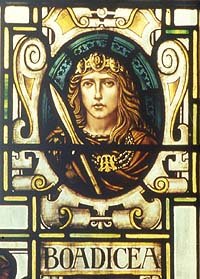
Takeover
As said previously the Romans controlled only most of the south of what is now England, and subjected the rest of the island and its tribes with a status of client-kingdoms. However, in the eye of the Romans, a client-kingdom status was nothing more than a staging post before complete absorption into the province on mid-term or long-term, depending the vigour and astuteness of the royal line in question.
Antedios, the leader of the Iceni tribe in nowadays Norfolk and Suffolk, had secured an alliance with the Emperor Claudius, and his own son Prasutagus renewed it with his successor, but growing in age, he had only daughters to succeed him and thought about an expedient to secure the fate of his house and of his people. Tacit says:
The Icenian king Prasutagus, celebrated for his long prosperity, had named the emperor his heir, together with his two daughters; an act of deference which he thought would place his kingdom and household beyond the risk of injury.
But he was wrong. Tragically wrong.
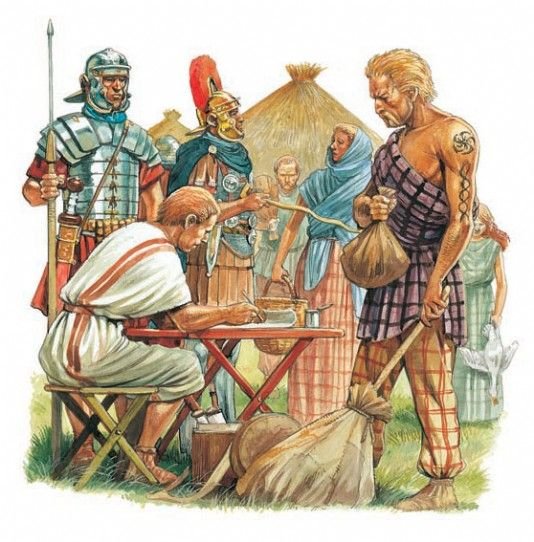
It is not clear from the sources what suddenly triggered the Romans to act but all manner of civilities were suddenly and brutally dismissed to annex the territory and people of the Iceni into the province, which implied dealing in a ruthless way with the family of Prasutagus:
As a beginning, his wife Boudicca was subjected to the lash and his daughters violated: all the chief men of the Icenians were stripped of their family estates, and the relatives of the king were treated as slaves.
The fact was the “Barbarians” were allowing their women to become leaders of the tribes might have been a factor in the Roman-psyche. The Romans simply didn’t consider women to be allowed to be in charge of any administrative or military charge. Applying their own code and laws, and showing by that in what esteem they held the local customs, they simply bypassed the will of the dead king and took over.
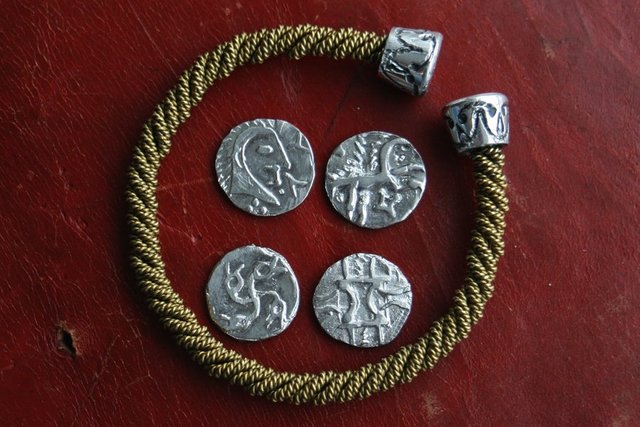
Iceni's coins and jewelry [Source]
The death of Prasutagus and the subsequent taking over timeline is not clear, however, most historians agree that it was somewhere before and during the campaign of Suetonius Paulinus against the resistance pocket in Anglesey. The fact that the Roman governor thought that he could deal with these two issues in parallel, without any kind of reinforcement from the continent, is testament that he didn’t think a rebellion possible.
But his actions were rushed, brutal and aborrant to the natives.
Plot

It seems that Boudicca went into hiding and linked up with the ousted chiefs of her tribe, and she managed to gather under her banner a whole network of far reaching allies.
For example, she obviously made contact with the Trinobantes, a neighbouring tribe, who had their own good reason to be mad at the Romans: the Governor had allowed his veterans to build a fully-fledged camp on their own turf. Tacit says:
The bitterest animosity was felt against the veterans; who, fresh from their settlement in the colony of Camulodunum, were acting as though they had received a free gift of the entire country, driving the natives from their homes, ejecting them from their lands.
As if this was not insulting enough, Tacit says:
More than this, the temple raised to the deified Claudius continually met the view, like the citadel of an eternal tyranny
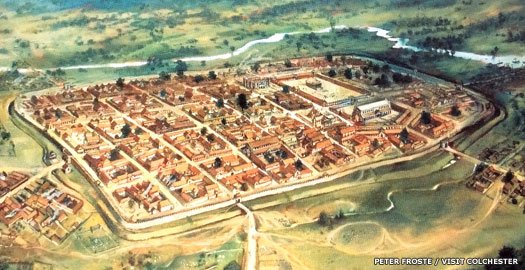
Recreation of Camulodunum/Colchester [Source]
No wonder that the Trinobantes decided to take up arms and join Bouddica’s rebellion.
Surprise
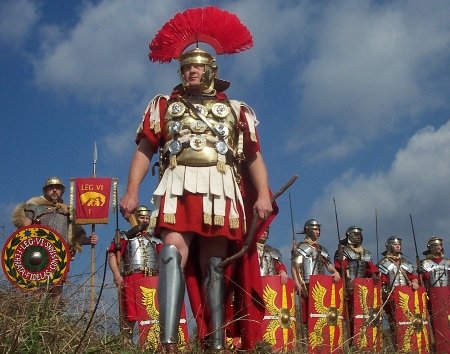
In Spring 61AD, at last, Boudicca made her move, while Suetonius Paulinus was busy ravaging the island of Anglesey and Dio Cassius says that she assembled a 120 000 strong army (surely counting women and children) and he gives a description of her:
In stature she was very tall, in appearance most terrifying, in the glance of her eye most fierce, and her voice was harsh; a great mass of the tawniest hair fell to her hips; around her neck was a large golden necklace; and she wore a tunic of divers colours over which a thick mantle was fastened with a brooch. This was her invariable attire.
Dio Cassius also mentions at great length a magnificent speech she gave to this mass of people, in which she makes her best to stoke the fire of rebellion and of hate against the Romans in the hearts of her people, along several lines.
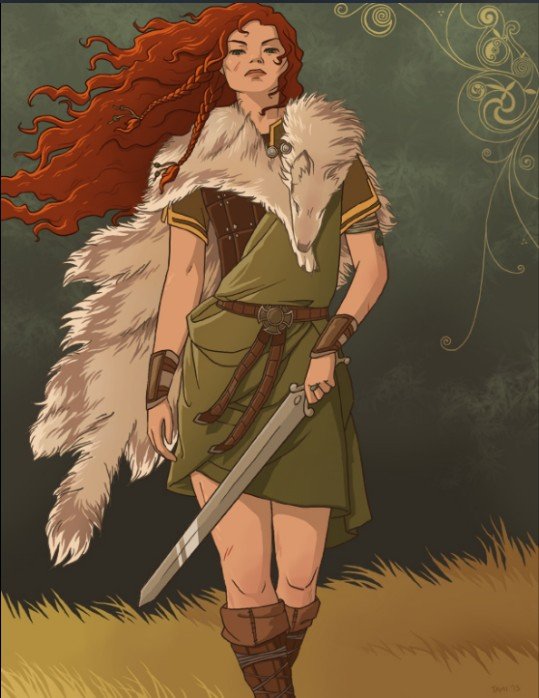
[Source]
First of all, the greed of the Romans:
Among the rest of mankind death frees even those who are in slavery to others; only in the case of the Romans do the very dead remain alive for their profit. Why is it that, though none of us has any money (how, indeed, could we, or where would we get it?), we are stripped and despoiled like a murderer's victims? And why should the Romans be expected to display moderation as time goes on, when they have behaved toward us in this fashion at the very outset, when all men show consideration even for the beasts they have newly captured?
Second, she stresses the fact that the Britons have no one to complain to about their situation better than themselves:
But, to speak the plain truth, it is we who have made ourselves responsible for all these evils, in that we allowed them to set foot on the island in the first place instead of expelling them at once as we did their famous Julius Caesar
Third, she tries to prove that the Briton fighting style and spirit is superior to the Romans:
Indeed, we enjoy such a surplus of bravery, that we regard our tents as safer than their walls and our shields as affording greater protection than their whole suits of mail. As a consequence, we when victorious capture them, and when overpowered elude them; and if we ever choose to retreat anywhere, we conceal ourselves in swamps and mountains so inaccessible that we can be neither discovered or taken.
It is of course subject to discussion if she actually said those words. The lines of her discourse are very similar to the arguments of Vercingetorix and Arminius, and maybe Dio Cassius took this opportunity to attack the greed of his fellow Romans through her mouth, but it is too interesting not to be mentioned.
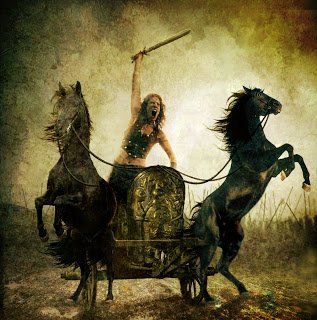
show them that they are hares and foxes trying to rule over dogs and wolves.
To be continued...Previous episode:
ENEMIES OF ROME 7.1 - BOUDICCA - The Warrior Queen
Sources:
http://penelope.uchicago.edu/~grout/encyclopaedia_romana/britannia/romanbritain.html
http://penelope.uchicago.edu/Thayer/e/roman/texts/tacitus/annals/14b*.html
http://penelope.uchicago.edu/Thayer/e/roman/texts/cassius_dio/home.html>
http://penelope.uchicago.edu/Thayer/E/Roman/Texts/Cassius_Dio/62*.html https://en.wikipedia.org/wiki/Fosse_Way
I really enjoy your Roman history posts - glad they are back.
Boudicca was certainly a bad-ass - I know how the story ends (although its a long time since I studied it at school!), but its useful to have the smaller details filled in.
Thanks! Yeah, she was the real deal! Unfortunately, the details are scarce... And of course it all comes down to us from Roman sources. So... It's patchy to say the least :-/
Its one of the problems of Roman history - written by the victors (for the most part!) Nonetheless, the details that historians like Tacitus, Livy, Suetonius et al managed to preserve are incredible, and have allowed to learn so much about this fascinating era. When combined with the Roman's rich literary, artistic and architectural legacy we get a really good snapshot of what life must have been like back then.